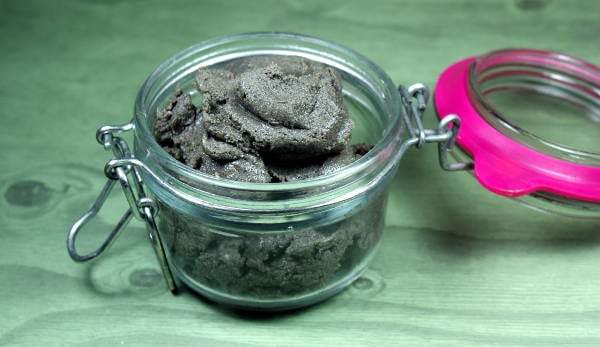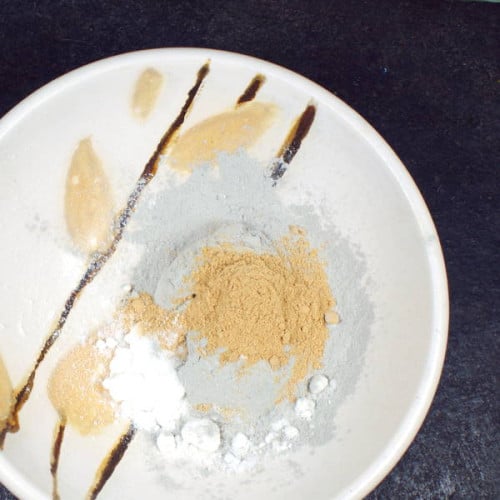
Orange & Coconut Face Scrub Recipe
Discover how to make an exfoliating facial scrub recipe for your natural skin care routine. Formulated with bentonite clay and orange peel powder, this face scrub is a wonderful solution for problem or acne prone skin. Additionally, you can also use this beauty DIY as a sugar body scrub for all-over skin care.

Orange Facial Scrub with Coconut Oil
This homemade orange and coconut face scrub recipe helps to detoxify and cleanse all skin types with natural oils and bentonite clay. It can even help to reduce breakouts or clear up acne. You’ll love that it also doubles as an exfoliating, natural body scrub!
What Makes This Face Scrub Great for Skin Care?
This natural orange and coconut face scrub recipe contains several key ingredients: bentonite clay, rosehip seed oil and orange peel powder. These ingredients each have unique skin care properties that benefit skin in different ways.

What is bentonite clay?
Bentonite clay is derived from naturally occurring volcanic ash sediments in the United States. Traditionally, bentonite clay has used to help with mineral deficiencies as well as to help bind toxins to make them more soluble. It is one of the most effective and powerful healing clays. Bentonite clay is commonly used externally as a clay poultice, mud pack, or in skin care recipes.
Why use rosehip seed oil?
Rosehip seed oil is prized for its anti-aging and anti-wrinkle properties in skin care as well as helping to nourish dry, weathered, and dehydrated skin. As rosehip seed oil is considered a “dry” oil it soaks easily into skin without leaving a greasy residue behind. It is a wonderful hydrator and because it is so gentle it can be used undiluted on skin. In addition rosehip seed oil is a safe, inexpensive, and effective product for helping to prevent and heal damaged skin.
What are the skin care benefits orange peel powder?
Orange peel powder contains natural alpha-hydroxy acid – in the form of citric acid – that helps to exfoliate and brighten skin. It’s also rich in vitamin C and other antioxidants. Antioxidants have been shown to help to prevent and repair skin damage caused by free radicals. In addition because antioxidants protect cells and encourage cell growth they are also believed to be helpful in an in fighting fine lines and wrinkles.

Homemade Orange & Coconut Face Scrub Recipe
© Rebecca D. Dillon
Ingredients:
These are the ingredients you will need to make this DIY facial scrub:
- .25 oz. coconut milk powder
- 2.25 oz. bentonite clay
- .15 oz. orange peel powder
- .75 oz. fine white castor sugar (you can use regular granulated sugar for a sugar body scrub)
- .3 oz. castor oil
- .25 oz. refined coconut oil
- .6 oz. rosehip seed oil
How to Make Orange Coconut Facial Scrub
Here’s how to make this natural beauty recipe for your skin care routine:
- Using a digital scale weigh out coconut milk powder, bentonite clay, orange peel powder and sugar into a medium to large glass or ceramic bowl. Whisk with a fork to combine all the dry ingredients.
- In a separate glass bowl weigh and add the castor oil, coconut oil and rosehip seed oil. If your coconut oil is solid, you can set the container of coconut oil in a bowl of hot water first to liquify it.
- Now slowly pour the dry ingredients in the oil mixture whisking with a fork as you go until the dry ingredients and oils are combined thoroughly.
- The mixture should be barely damp but damp enough it sticks together. As the coconut oil re-solidifies the orange and coconut face scrub recipe may feel slightly drier. This is fine. What you don’t want is your ingredients floating in oil. If the mixture is too dry, add a small amount of rosehip seed oil.
- Spoon the mixture into a 4 oz. jar.
Usage
To use simply remove a small amount of the orange and coconut face scrub from the container. Then combine it with a small amount of water in your hand. Massage onto your face to gently cleanse, detoxify and exfoliate.
To use this mixture as a face mask, mix with water to form a paste. Use just enough water so that the coconut face scrub glides onto skin. Then apply to your face avoiding the eye area. Leave on for about 10 minutes, then with wet hands re-wet and massage the mask onto your face to exfoliate, then rinse and pat dry.
After using this coconut face scrub, follow with your favorite moisturizing facial toner. Then apply your normal moisturizer or face oil.
For oily skin, you can use this mask several times a week. For drier skin, use this product less often.
This orange and coconut face scrub recipe can also be used a body scrub for other problem skin areas.
For even more of my skin care recipes, be sure to follow me on Pinterest. I love to share collections of my favorite bath and beauty recipes from around the web in addition to my own natural skin care recipes.
You can also keep track of all my new beauty and skin care recipes by following Soap Deli News blog via Blog Lovin’, Facebook, Twitter, and Instagram.




3 Comments
Anne-Marie
May 13, 2015 at 7:20 pm
This orange and coconut face and body scrub recipe seems so delightful. Thanks for sharing your recipe =)
Peaceflheart
May 21, 2015 at 6:01 am
Hello Rebecca!
I love your blog and recipes. I do wonder about one issue, do you recommend a preservative in the skin care products? If so/not why and which one?
Thank you!
Peaceflheart
PureMichiganSoap.com
Rebecca D. Dillon
May 21, 2015 at 6:36 pm
Any product with water must have a preservative to avoid growth of mold, fungus and bacteria – especially if you are selling said product. If a product is for personal use and contains water, I highly recommend refrigeration and using it within a week time frame or less. For products that don’t contain water a preservative isn’t typically necessary. However with scrubs and such where water may come in contact with the product it’s wise to use a preservative – especially if it’s something you plan to sell. Optiphen and Optiphen Plus are good paraben free preservatives. There are restrictions based on PH and temperatures at which to add the preservative. Optiphen Plus for example should only be used in products with a PH below 6 and should be added at 160 degrees or less. Optiphen should be added at below 140 degrees F but above 120 degrees F as if temperatures are too cold it can cause the emulsification – such as when using in lotions – to become unstable. Also both of these are not lip safe. There are others, so I recommend reading up on them and determining which ones are best for your product choice.
Comments are closed.